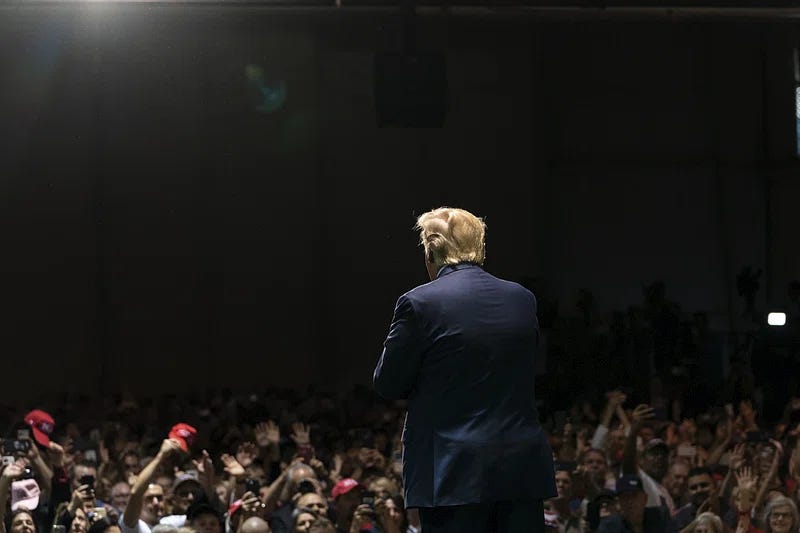Conservatism and Charismatic Leaders
If conservatives act emotionally and out of fear rather than deliberately and thoughtfully, we risk losing not just elections, but our entire political tradition.

In a political climate marked by polarization and strife, conservatives face a philosophical dilemma that will determine the future of the Republican Party. At the core of this dilemma lies Max Weber's theory of charismatic authority—a framework that serves to both enlighten and warn conservatives. While charismatic leaders captivate the public imagination and dominate media headlines, it's imperative for conservatives to scrutinize the implications of their appeal.
Weber classified authority into three distinct categories: traditional, legal-rational, and charismatic. Of the three, charismatic authority is the most emotionally charged, the weakest, and the most unstable, relying heavily on the extraordinary magnetism of an individual leader. In its volatile nature lies its weakness, making it susceptible to sowing division and stifling rational discourse. As Saul Alinsky observed, “Periodic mass euphoria around a charismatic leader is not an organization. It's just the initial stage of agitation.”
Trump, the king of agitation, sits atop a mountain of charismatic authority. He has won. There is no one who surpasses him in this regard. His most devout supporters occupy an entirely separate reality. Propped up by MAGA media, disinformation, and outright propaganda, his legend has grown to an unhealthy stature amongst his most ardent supporters—he has been deified.
Newsmax host Wayne Allyn Root writes, “Trump is literally both a man of destiny and a walking miracle…Trump is the chosen one.” Sound of Freedom actor Jim Caviezel says, “I believe Donald Trump was selected by God Almighty.” The New York Republican Club writes, “President Trump embodies the American people—our psyche from id to super-ego—as does no other figure; his soul is totally bonded with our core values and emotions, and he is our total and indisputable champion.” These aren't isolated voices. They are symptomatic of a larger issue: the hollowing out of conservative intellectualism in favor of blind allegiance to charismatic figures.
It's crucial to recognize the ripple effects this kind of deification has on the broader conservative ecosystem. Trump is not alone—his rise has led to the emergence of lesser political figures like Kari Lake, who rode the wave of Trump's charismatic authority to prominence.
Lake, a former news anchor turned politician, has frequently echoed Trump's rhetoric and made media vilification a central part of her persona. While this strategy may gain attention and fundraising dollars, it's a form of grift that offers nothing in terms of substantive policy solutions and has left the Arizona GOP near bankruptcy. What's more, it perpetuates a culture of losing by fixating on performative outrage rather than on strategic, long-term victories. Lake’s record, zero political or legal wins, shows the objective weakness of this movement.
To understand why we’re in this mess, it's important to consider the broader socio-political landscape. The rise of social media, the truncation of media and news into outrage machines and advertising farms, and an increasingly polarized public have created fertile ground for charismatic figures to flourish. In a world of 'us vs. them,' nuanced policy discussions often take a backseat to captivating narratives and emotional appeals. For a conservative base and a large apolitical population that feels marginalized in popular culture and media, charismatic leaders offer a sense of empowerment and identity. It's a shortcut to political engagement, but it's one that sidesteps rigorous intellectual participation.
Most importantly, in an era beset by complex social and economic challenges, many people find themselves unmoored from traditional political ideologies, searching for immediate answers and decisive leadership. In this landscape, a charismatic figure becomes not just a leader but a compelling narrative—a story that simplifies the complexities of the modern world. This narrative allure easily sways those who might not have rigid ideological convictions, offering them a rallying point regardless of inconsistencies or impracticalities in policy or governance. It serves as a cautionary tale: in our haste to find solutions, we risk elevating personality over principles, charisma over conservatism.
Instead of discussing tangible conservative policies that could address key issues, the conversation devolves into spectacle. The result is a brand of conservatism that is not only intellectually impoverished but also politically ineffective. We have traded statesmanship for showmanship, casting aside our political capital in the process. The endgame of this trend is a movement that fails to achieve meaningful policy goals and, more importantly, loses any sense of identity.
The responsibility falls on us—conservatives who value intellectual integrity—to challenge this culture. The time for passive observation has passed. We must foster intellectual spaces where rigorous debate can thrive and throw our support behind leaders who stand for governance, not just grandstanding. The future of our movement depends not just on recognizing the challenges before us, but on actively working to confront them. If we don't act deliberately and thoughtfully, we risk losing not just elections, but our entire political tradition.
Philip Reichert is a conservative writer and activist. He is a former U.S. Army intelligence analyst, contractor for the U.S. Space Force, and producer at Fox News. @PhilipReichert



This isn't just an issue for the United States. It's clear in other parts of the world as well that conservative politicians favor charisma as a strategy when their actual political agendas lack substance. In Canada, where I live, we have a Conservative party as the official opposition in Parliament, and the leader addresses the media like the king-in-waiting he seems to think he is- when, in fact, the lack of substance the party has is brutally apparent to non-adherents.